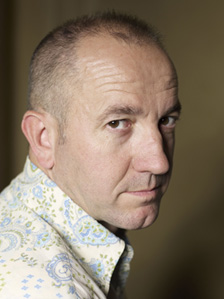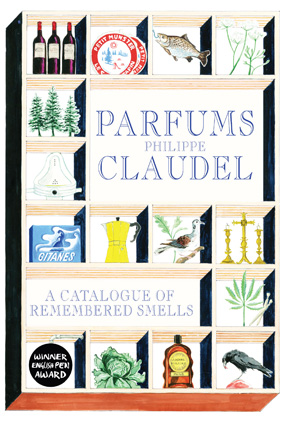Rainstorm
by Philippe ClaudelYou could bang your fist on the earth as you might bang it on the table. We’ve been waiting so long for the fight to begin. For days and days the sky had been filled with a heavy lead and a heat that stunted the horizon, shackled the wind, and made people and animals feel restless. There had been no coolness even at night, which was just like daytime, affected by the obscene palpation of a mugginess that seemed to believe it belonged everywhere and at all times. Windows are left open to no avail. And then, in the early afternoon, the sky to the north over the Seille country seems to grow taut and start to rustle. Subdued glimmers can be seen, as in a sort of stuttering apocalypse. Everything grows dark. I’m reminded of those Good Fridays when we wait to see how the storm clouds will commemorate the Crucified Man of Golgotha. A crash of light and fury. The thunderbolt’s axe strikes a willow tree by the pond. We hadn’t seen it coming. A tree split in two, twitching, revealing its white flesh from top to bottom, like a pale thigh emerging from a torn stocking. Thunder strikes again, three hundred metres further to the left, on an electric pylon. Hysterical streaks of lightning. The passing signature of a megalomaniac artist. The heifers in Poulet’s field hurtle off and charge towards the river, only to pause again, foolishly, at the top of the embankment, where they come to a halt. A murmur. That grows louder. It’s the rain which, having caused the banks of the Rambêtant to vanish under a streaked screen, rushes through the air like a tide, engulfs the coppices beside the Grand Canal, soaks up the fields, slips away towards our house and is already streaming over the back gardens. The cat glides under the flat stone propped awkwardly against the rabbit hutches. Isolated drops provide the first dull notes, just by the chicken-run, and then the bulk of it arrives, a slanting and weighty ill-disciplined army that slashes shamelessly at the last of the tulip petals, shreds the still delicate leaves of the cherry trees, humiliates the peonies by forcing them to bow their creamy heads before crushing them to the ground, while the hailstones create millions of craters the size of a thumbnail in the ground. An elemental massacre. A bombardment. A cataract. The water refreshes the air and slices through it. It’s the snout of a monster blowing its hot tropical breath straight in our faces. Muddy waters stream in miniature rivers along the footpaths, and shimmering pools form at the foot of the raspberry canes. Sheltered from the storm, people shiver slightly, and they smile as they sniff the wafts the destruction has brought, humus from the marshlands, peat, sap, seeds from the corollas of lilies with weeping petals like rags, hairs from the agitated cattle mooing in chorus in the distance, bubbles of silt blown up by the ripple of new lavender whose growth has been stimulated by the storm, resin come from nobody knows where, and once the wind has arisen at last, it takes its revenge and fans all this with the last drops of rain as it drives the jumble of exhausted clouds and the thunderclaps towards the east, where for the time being it is still peaceful.
From Parfums: A Catalogue of Remembered Smells. Out now in hardback at £12.99 from MacLehose Press
 Philippe Claudel is a novelist, film director and university lecturer. He is the author of the novels Grey Souls, Brodeck’s Report (winner of the 2010 Independent Foreign Fiction Prize), Monsieur Linh and His Child and The Investigation. Parfums, now published by MacLehose Press, is an evocative memoir of fading aromas, capturing moments that have driven the author to delight and despair. Read more.
Philippe Claudel is a novelist, film director and university lecturer. He is the author of the novels Grey Souls, Brodeck’s Report (winner of the 2010 Independent Foreign Fiction Prize), Monsieur Linh and His Child and The Investigation. Parfums, now published by MacLehose Press, is an evocative memoir of fading aromas, capturing moments that have driven the author to delight and despair. Read more.
Author portrait © David Balicki


